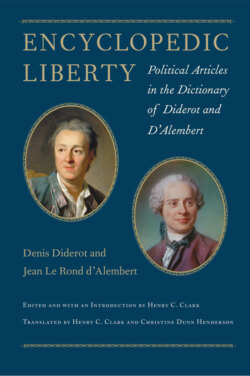Читать книгу Encyclopedic Liberty - Jean Le Rond d'Alembert - Страница 26
На сайте Литреса книга снята с продажи.
Оглавление[print edition page 65]
Competition †
(Concurrence)
COMPETITION, in matters of commerce. This word sets out the idea of several persons aspiring to one preference: thus, when various individuals undertake to sell the same commodity, each one strives to offer it better or at a lower price, to obtain the preference of the buyer.
One immediately sees that competition is the soul and the spur of industry, and the most active principle of commerce.
This competition is either external or internal.
The external competition of a nation’s commerce consists in being able to sell abroad the products of its land and industry in the same quantity as other nations sell theirs—proportional to their respective populations, their capital stock, and the extent and fertility of their lands. The nation that does not sustain this competition in the proportion that we have just discussed will inevitably possess power that is inferior to that of others, because its men are less employed, less rich, less happy, thenceforth relatively fewer—in short, in less of a position, relatively speaking, to support the commonwealth. It cannot be too often repeated: the balance of trade is truly the balance of power.
This external competition is not obtained by force; it is the value of the efforts that human industry makes to grasp the tastes of the consumer, even to predict them and stimulate them.
Internal competition is of two kinds: one, between domestic commodities and foreign commodities of the same nature or the same use; and another type, depriving the people of the means of subsistence, should in general
[print edition page 66]
be proscribed. Those who contribute to introducing it—either by buying or selling—are genuinely guilty of increasing or maintaining the number of poor with which society is burdened.
The other type of internal competition is that of work among subjects: it consists in the fact that each of them has the capacity to be employed in the manner that he believes most lucrative, or that is most agreeable to him.
This is the principal basis of the freedom of trade: it alone contributes more than any other means to bringing to a nation that external competition which enriches it and makes it powerful. The reason is very simple. I won’t, perhaps, say that every man is so unfortunate as to be naturally inclined to work, but he is naturally inclined to procure his ease; and this ease, the wages of his labor, then makes his occupation agreeable to him. Thus, as long as no internal vice in the state’s administration sets obstacles to human industry, this industry enters by itself into the lists. The more substantial the number of its products, the more moderate is their price; and this price moderation obtains the preference of foreigners.
However, as money enters a state in this way, as the people’s means of subsistence multiply and the number of, or competition among, consumers increases, commodities must be represented by a larger sum. This increase in the price of everything is real, and is the first effect of the progress of human industry. But a fortunate circle of new competitions ushers in appropriate arrangements. The commodities subject to consumption become daily more abundant, and that abundance partly moderates their price increase; the other part is distributed imperceptibly among all those who produce things, or who exchange them, by the reduction in their profits. The reduction in this profit is itself compensated for by the reduction in interest rates, since, as the number of borrowers is found to be fewer than the number of lenders, money loses its value by unanimous agreement, like any other merchandise. This lowering of interest is, as we see, the result of active trade. Thus, we will observe in passing that in order to know whether a nation that has no mines is engaging in as much commerce as others—relative to the respective facility that each has to engage in commerce—it is enough to compare the rates of interest in each. For it is certain that if the competition in these rates is not equal, there will be no equality in the external competition in sales and shipping.
[print edition page 67]
When, by these manifest signs, one perceives a constant increase in a state’s commerce, all of its parts act and transmit equal movement to each other; it enjoys the full vigor of which it is capable.
A similar situation is inseparable from great luxury. It extends over diverse classes of the people because they are all prosperous. But the luxury that produces public ease, through increase of work, is never to be feared; external competition constantly checks its excess, which would otherwise soon be the fateful end of all prosperity. Human industry then opens new routes; it perfects its methods and its works. Frugal use of time and energy in some sense multiplies men; needs give birth to the arts, competition lifts them up, and the artists’ wealth makes them knowledgeable.
Such are the prodigious effects of this principle of competition—so simple at first sight, as are virtually all the principles of commerce. This one in particular seems to me to have a very rare advantage, namely to be subject to no exceptions. This article is by M. V.D.F.
